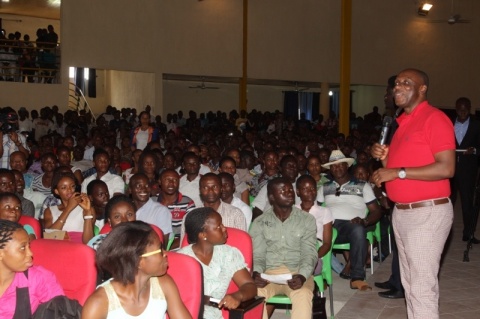[OPINION] Results Prioritization: Nigerian Campuses, Lazy Students and the Society
Articles/Opinion, Latest Headlines Friday, November 10th, 2023
Nigerian students can go to the farthest extent because of a ‘5.’ The latter is a grade that represents ‘excellence.’ Next to it is ‘4’ which signifies ‘very good’, and in that order. Thus, the students need as many as possible 5s to graduate with a distinction or first class, It is for this reason that exam season becomes a do or die affair. Every available means is utilised. While I am not arguing against good results, students’ failure to exemplify their good results is not encouraging. This admonition is not for students who study their courses tightly. It is for students who see grades as optimal. They cram in few days to exam and replicate what is called ‘Agberu gbeso’ meaning, offloaded as uploaded. They cannot recall or teach what they’ve ‘learnt’ over time. During examination, this kind of students observe ‘tutorials’. Do you care about the tutorials? lazy students see it as an opportunity to socialize; they cannot afford to spend two hours to learn on their own. Tutorials, however, work for serious students, especially those whom you can easily tell from their consistency and doggedness; not those tutorials whose results are either pregnancy or rituals.
Night class is a common phenomenon. It is a technique that lazy students must employ before getting good grades. Such a student spend the whole semester partying and spearheading entertaining events, watch movies, and may not even attend classes. So, when exam is a week away, they exhaust themselves on campus conducting night reading that they mandated upon themselves. The sad aspect of it is that some of this night ‘readers’ sometimes miss out on the exams as they often face health challenges as a result of the burdensome sleepless nights from the night readings. Cases of students being rushed out of exam hall are not limited. It happens across all universities. This explains why school clinics are often filled with patients during exams. No wonders, specialists warned us severally against this act at orientation programs in my days as a campus fresher. Some students, helplessly, sleep pass their exams while some feel drowsy in the examination hall. You cannot cheat nature!
Still, another method that students use to pass and have good grades is through the borrowing of sure courses. The language ‘borrow’ in this context refers to the required and elective courses that students offer, (supposedly should relate to their discipline) outside their departments and faculties. This system has however been transmogrified as students (in some universities) now borrow courses without restrictions or regulations. You wonder why a Mathematics student offer Yoruba as elective, or why an engineering student would borrow Music? They may not attend the classes before passing those courses. Having interviewed a number of students across Nigerian universities, I realized that such courses as; Music and Performance; Marketing; Sociology; and some social sciences, receive students’ registration. These courses are naturally easier and require no much reading, at least, when compared to some other courses. They become necessary so much so, that students see them as must-do, and even advise their juniors to offer the CGPA ‘boosters.’ Let me reiterate that they don’t do these courses because they deem it beneficial or relevant to their course of study, neither for the purpose of adding value, but for the ‘sure 5’ such courses offer. Hence, they forfeit courses that are related to their discipline. Those ones which equire much time and efforts.
This set of students yet better off those who clandestinely bribe their ‘lecturers’ to get good grades that they never worked for. Do you wonder what could have given students such audacity? Some lecturers are crooks. They are not ashamed of taking bribe from their own students, sometimes worthy enough to be their child. Before they are overwhelmed with blames, the Nigerian government falls short of paying lecturers with low salaries that a five-years summation of it may not equal to a month salary of politicians. But, is there excuse for corruption? Definitely No! As if bribery were not enough, female students tender thier body for ‘5’. They allow lecturers take advantage of them because they have to get their wants by exchanging their haves. Also, lecturers take a bulk of the blame.
This is largely consequential of laziness and results prioritization. Conversely, the economy is not such that overrates results aside being a prerequisite for job seekers and a distinction between a literate and an illiterate.
Prioritization of results answers why many graduates don’t find opportunity in private institution. It is not always about low remuneration; profit-based enterprises don’t employ liability. The same reason speaks to why many public offices are mismanaged by incompetent personnel who find their way into the system through corruption, nepotism, tribalism and favouritism. Many doctors and health attendants have become killers as a result of incompetence. These are doctors who graduate on good honours! Close at hand, many a lecturer replicates the poor education they received. Thus, their incompetency is as clear as day. More so, they cannot give what they don’t have. So, instead of providing the supposed service(s) they render the students ill-literate.
The earlier the students realize the harm they do to themselves by reading to pass, while not acquiring values, the better. Students should not be lazy while they expect positive results. People like Dr Philip Emeagwali, a computer scientist, Dehlia Umunna, a Clinical Professor of Law at Harvard Law School, and global academics like Wole Soyinka, late Chinua Achebe, Toyin Falola, among others, wouldn’t be celebrated if they were last minutes readers as prevalent in most universities today.
Students should pursue good grades but not at the expense of their creativity and innovative minds.
Abdulkabir Muhammed writes from the Lagos State University. He can be reached via 08142957061 or abdulkabirm87@gmail.com
Related Posts
Short URL: https://www.africanexaminer.com/?p=92134






















